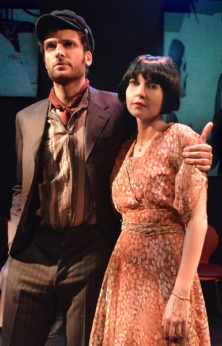
LOS ANGELES—In its world premiere production (seen opening night, July 21), veteran playwright Murray Mednick debuts Mayakovsky and Stalin, a title certain to prick up the ears of any conscientious People’s World reviewer! Comrade Stalin surely needs no introduction; but perhaps it’s worth a reminder about Vladimir Vladimirovich Mayakovsky (1893-1930).
A born revolutionary involved in radical activism from his early youth onward, Mayakovsky devoted himself to poetry, theatre, and politics. A Dionysian futurist who set out to break conventional molds, he seemed addicted to opposing stupidity, authority, and rules—and also to gambling and vodka. He released a torrent of books, inspired, after June 1914, by his muse and lover Lilya Brik, married to Osip Brik, all of whom shared then-current ideals of free love. The couple supported Mayakovsky and helped usher his works into print.

Although his bold, post-romantic gestural poetry that aimed at smashing every established literary and social canon attracted an admiring audience in the first decade of liberatory Bolshevism, and made his name famous even among proletarian readers far beyond the literary circles, it was not long before he found himself censored by faceless bureaucrats as the doctrine of socialist realism started taking hold. Works that contained criticism or satire of aspects of the Soviet system, such as the poem “Talking with the Taxman About Poetry” (1926), and the plays The Bedbug and The Bathhouse (both 1929), met with scorn by the newly codified cultural apparatus increasingly loyal to Stalin.
Mayakovsky shot himself in the heart in 1930, leaving a suicide note saying he saw no other way out. Three days later his funeral was attended by 150,000 mourners, the third largest event of public grief in Soviet history, surpassed only by the outpouring for Lenin in 1924 and Stalin in 1953. Yet the circumstances around his death were controversial. Neighbors reported hearing two shots. The bullet in his body did not match the model of his pistol, and ten days later the officer investigating the death was himself killed. Immediately, his work disappeared from sight.
In 1935, however, Lilya Brik daringly wrote a letter to Stalin imploring him to help restore the poet’s reputation. Now that he was safely out of the way, Stalin, then in the midst of the Great Purge of former Bolsheviks and loyal communists who could conceivably be his competitors in the military and in virtually every other sector, decided that a dead poet no longer represented a threat. He could endear himself to Mayakovsky’s followers by now enshrining him in the pantheon of Soviet literary heroes. Stalin proclaimed him “the best and the most talented poet of our Soviet epoch. Indifference to his cultural heritage amounts to a crime”—pretty strong language considering the source. Overnight, significant sites, including his birth town in Georgia and a new Metro station in Moscow, heralded his name. Even as late as the 1970s, Mayakovsky’s reputation was still being officially enhanced with the dedication of a state museum devoted to him in the building where he lived from 1919 to 1930.
Dictator (Maury Sterling) and poet (Daniel Dorr): Both worthy characters to explore dramatically. Mednick surrounds their evolving stories with Lilya (Laura Liguori) and Osip (Andy Hirsch) Brik, and with her sister Elsa (Alexis Sterling) and mother Yelena (Rhonda Aldrich); and on the Stalin side, with his second wife Nadya (Casey McKinnon), their household help Masha (Ann Colby Stocking) in the Kremlin apartment they share, and an omniscient Chorus (Max Faugno) who narrates mostly in the author’s voice, recounting his summers as a waiter in the Catskills, but also plays other individuated characters, most notably Stalin’s confidant Sergei Kirov, Communist Party leader in Leningrad, who was assassinated in 1934.

Needing to fill out the women’s roles in the title characters’ lives, the playwright focuses on Nadya’s extreme unhappiness as Stalin’s wife. His first wife died before the Revolution under suspect circumstances, and in 1919 the widower at 40 married Nadya, the 18-year-old daughter of revolutionary railway worker Sergei Alliluyev, who had once sheltered Stalin after one of his escapes from Czarist exile. After a public spat with Stalin at a 1932 Communist Party dinner, reportedly over the government’s collectivization policy and its impact on the peasantry, Nadya retired to her bedroom and shot herself. Officially, she died of “appendicitis.” According to the Chorus, Stalin was unable to speak for weeks afterward. Silence about her suicide ended in the USSR only in 1988.
We come to see how a power-hungry, friendless authoritarian such as Joseph Stalin consolidated his one-man rule over the Soviet system—“We are the Revolution,” he says, styling himself as “a sincere intellectual”—not even blinking before ordering the murders of his real or perceived enemies, or their imprisonment or exile. The Brik couple, both Jewish, remained active in Soviet life for years—Osip died in 1945, and Lilya died at the age of 86 in 1978, friend to many of the leading lights of Soviet and international culture. Stalin had a particular animus against what he called “cosmopolitan” Jews—Kirov included—so it’s a small miracle that the Briks survived at all.
Now, about the play. There is a lot of history and background to expound upon: The characters are often in the position of illustrating the exposition narrated by the Chorus. In fact, the entire cast of nine are seated on red chairs throughout both acts, rising for their scenes as required in staged reading style. Their dialogue, rarely between more than two or three people, is recited with all due theatrical emotive effect, but there’s almost no physical action. Atmospheres are filled in with projections. With only minor adaptation to indicate which character is speaking, it’s ideally suited for radio. One might honestly ask, Why bother staging it at all?
We learn most of what we are asked to absorb in the first act. I don’t know Mednick’s other plays, but in this one he seems to use language like film montage of the early Soviet era, words recapitulating themselves as if in quick successive frames in the expectation that restated, repeated, reiterated, they will acquire new depths and facets of meaning. The nonlinear approach only extenuates the length of the play without furthering our understanding. He did not require two acts to communicate what he needed to, whatever the rhetorical mode he chose to adopt.
Mednick devotes some attention to the pre-revolutionary era, when Stalin and Mayakovsky were both unscrupulous brigands for the cause. This is actually helpful because we see that theoretically, at least, they are on the same side, and equally amoral. Another chunk (but a disjointed one) is given to the chaotic civil war period which cauterized the ideological struggle between Reds and Whites, but in which the playwright chooses to ignore the backward role of the Orthodox Church in opposing the Revolution and also the role—including the military forces—of the Western powers that sought to exhaust and defeat the Revolution.
Most playgoers will certainly feel little sympathy for the dictator who declares that harsh measures are needed, that party members must give up their personal security, who rails against the Jews, who drives one or perhaps both of his wives to suicide and compiles lists of “enemies.”
Yet if I may play devil’s advocate for a brief moment before this play ends its run, it’s also true that, as he says in the script, he sought the advancement of women in the military and in the professions, he urges Nadya to get out of the house and make herself useful, he relies on no souls and spirits to determine his course of action, believes he is fated to stand at the top of the pyramid and bend history to his will, and prefers social planning—otherwise the rich will take over again.
Crude and criminal though he was, Stalin was nevertheless capable of setting the course for some truly admirable socialist achievements, and rallying the far-flung Soviet people to defeat Nazism. One doesn’t have to like the man—or even to take sides on the question of whether he did more to advance socialism or to discredit it—to acknowledge his undeniable preeminence in history. I’m not even sure Mednick intended to convey that “balanced” view, but I believe it comes across if a viewer takes a broad, eagle’s-eye view of the 20th century.
Mednick himself directs and gets the best he can out of his actors, which in many cases is very good indeed; but they are crimped by the overall dramatic conceit. I could see this same material, which did hold my interest up to a point, reworked into a more viable form in a rewrite.
Mayakovsky and Stalin plays through August 19 at The Lounge Theatre, 6201 Santa Monica Blvd., Hollywood 90038 (just east of Vine) on Fri. and Sat. at 8 p, and Sun. at 3 pm. For tickets call (323) 960-4443 or go here.
Like free stuff? So do we. Here at People’s World, we believe strongly in the mission of keeping the labor and democratic movements informed so they are prepared for the struggle. But we need your help. While our content is free for readers (something we are proud of) it takes money — a lot of it — to produce and cover the stories you see in our pages. Only you, our readers and supporters, can keep us going. Only you can make sure we keep the news that matters free of paywalls and advertisements. If you enjoy reading People’s World and the stories we bring you, support our work by becoming a $5 monthly sustainer today.










